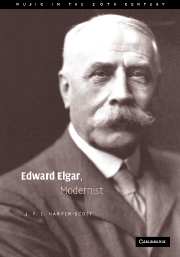Book contents
- Frontmatter
- Contents
- Preface
- 1 Styles and ideas
- 2 A Heideggerian refinement of Schenker's theory
- 3 Immuring and immured tonalities: tonal malaise in the First Symphony, Op. 55
- 4 ‘Fracted and corroborate’: narrative implications of form and tonality in Falstaff, Op. 68
- 5 Hermeneutics and mimesis
- 6 The annihilation of hope and the unpicking of identity: Elgarian hermeneutics
- 7 Modern music, modern man
- Glossary
- Bibliography
- Index
Preface
Published online by Cambridge University Press: 03 May 2010
- Frontmatter
- Contents
- Preface
- 1 Styles and ideas
- 2 A Heideggerian refinement of Schenker's theory
- 3 Immuring and immured tonalities: tonal malaise in the First Symphony, Op. 55
- 4 ‘Fracted and corroborate’: narrative implications of form and tonality in Falstaff, Op. 68
- 5 Hermeneutics and mimesis
- 6 The annihilation of hope and the unpicking of identity: Elgarian hermeneutics
- 7 Modern music, modern man
- Glossary
- Bibliography
- Index
Summary
This book grew from a belief in meaning, and the desirability of discovering it, in musical works and human life. It was written to satisfy a perceived need for musical criticism that retreats neither into conservative, narrowly formalist analysis nor into poststructuralist hermeneutics guided by nihilistic Foucauldian or Derridian dogma; a criticism which does not allow for a potentially tendentious location of musical works in scores, psychological states, political ideologies, socio-historical constellations, or mere physical reverberations, but acknowledges that music is, before we make it anything else, itself – a distinctive entity with its own ontology that can be unveiled, understood, and relocated within the world (and not just a musicologist's favourite part of that world). It is intended as a challenge to old and new orthodoxies.
But more than that or anything else it is intended as an analysis of Edward Elgar's music. Its focus on his music, not his life, makes this book an unusual contribution to Elgar scholarship. And the particular critical attitude adopted in writing it deserves clarification, for which words written to open another book may serve.
To study the lives of great artists is often a positive hindrance to the understanding of their works; for it is usually the study of what they have not mastered, and thus it undermines their authority in the things which they have mastered … Even if the works of art show characteristics closely resembling the faults of the author, we have always to remember that the business of the work of art is to be itself, whereas neither the science of ethics nor the structure of society can thrive for long on the denial that it is the duty of a man to improve himself. […]
- Type
- Chapter
- Information
- Edward Elgar, Modernist , pp. ix - xivPublisher: Cambridge University PressPrint publication year: 2006

